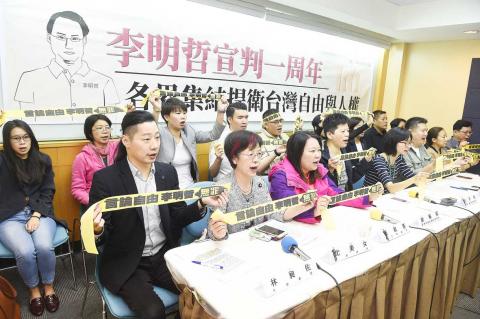A coalition of civil groups yesterday called for the immediate release of human rights advocate Lee Ming-che (李明哲) and urged the government to continue pressuring China on the issue, after an application by Lee’s wife, Lee Ching-yu (李凈瑜), to visit her husband was rejected by the Chinese government earlier this month.
“It has been exactly one year since Lee was sentenced to prison and we urge the Taiwanese government to continue taking measures to demand his release,” Taiwan Association for Human Rights secretary-general Chiu Ee-ling (邱伊翎) told a Taipei news conference jointly held by the association, Amnesty International, Covenants Watch and other groups.
Taipei Mayor Ko Wen-je (柯文哲) should use the Dec. 20 twin-city forum between Taipei and Shanghai as an opportunity to lodge a protest with Beijing over the way Chinese authorities arbitrarily transferred Lee to different prisons and denied visitation rights to his family members, she said.

Photo: Chen Chih-chu, Taipei Times
The groups have previously called on the Taiwanese delegation to the APEC summit to demand Lee’s release when meeting Chinese President Xi Jinping (習近平) earlier this month, but the delegation did not mention anything about Lee throughout the summit, Chiu added.
Lee was on Nov. 28 last year sentenced to five years in prison for “subversion of state power” after holding online lectures on democracy and helping families of jailed dissidents in China.
He was arrested in March last year when entering China from Macau, and yesterday was the 619th day of his detention, Chiu said.
Authorities had allowed Lee’s family to visit him five times since March, but have stopped allowing visits since September, she said.
In October, the family received indirect information that Lee had been transferred to another prison, although no explanation was given, she said, adding: “There is absolutely no information about him at the moment and that raises concerns about his well-being.”
Chiu also mentioned a referendum that sought to change the national team’s name from “Chinese Taipei” to “Taiwan,” which was rejected on Saturday.
“Many foreign media outlets have interpreted the election results as an indication that Taiwan is leaning toward China, but we are here today to show that Taiwanese will defend their freedom of speech and human rights, that we will not approve of Beijing’s values and disregard for human rights,” she said.
Her view was echoed by Democratic Progressive Party Legislator Yu Mei-nu (尤美女), who vowed to continue voicing support for Lee and calling for his release “until the day he is freed.”

South Korean K-pop girl group Blackpink are to make Kaohsiung the first stop on their Asia tour when they perform at Kaohsiung National Stadium on Oct. 18 and 19, the event organizer said yesterday. The upcoming performances will also make Blackpink the first girl group ever to perform twice at the stadium. It will be the group’s third visit to Taiwan to stage a concert. The last time Blackpink held a concert in the city was in March 2023. Their first concert in Taiwan was on March 3, 2019, at NTSU Arena (Linkou Arena). The group’s 2022-2023 “Born Pink” tour set a

CPBL players, cheerleaders and officials pose at a news conference in Taipei yesterday announcing the upcoming All-Star Game. This year’s CPBL All-Star Weekend is to be held at the Taipei Dome on July 19 and 20.

The Taiwan High Court yesterday upheld a lower court’s decision that ruled in favor of former president Tsai Ing-wen (蔡英文) regarding the legitimacy of her doctoral degree. The issue surrounding Tsai’s academic credentials was raised by former political talk show host Dennis Peng (彭文正) in a Facebook post in June 2019, when Tsai was seeking re-election. Peng has repeatedly accused Tsai of never completing her doctoral dissertation to get a doctoral degree in law from the London School of Economics and Political Science (LSE) in 1984. He subsequently filed a declaratory action charging that

The Hualien Branch of the High Court today sentenced the main suspect in the 2021 fatal derailment of the Taroko Express to 12 years and six months in jail in the second trial of the suspect for his role in Taiwan’s deadliest train crash. Lee Yi-hsiang (李義祥), the driver of a crane truck that fell onto the tracks and which the the Taiwan Railways Administration's (TRA) train crashed into in an accident that killed 49 people and injured 200, was sentenced to seven years and 10 months in the first trial by the Hualien District Court in 2022. Hoa Van Hao, a